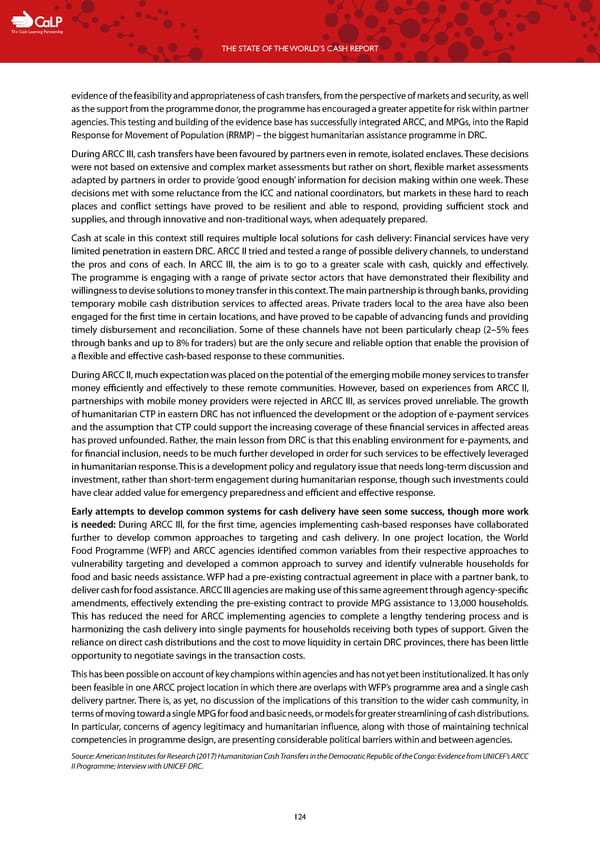C The Cash Learning Partnership THE STATE OF THE WORLD’S CASH REPORT evidence of the feasibility and appropriateness of cash transfers, from the perspective of markets and security, as well as the support from the programme donor, the programme has encouraged a greater appetite for risk within partner agencies. This testing and building of the evidence base has successfully integrated ARCC, and MPGs, into the Rapid Response for Movement of Population (RRMP) – the biggest humanitarian assistance programme in DRC. During ARCC III, cash transfers have been favoured by partners even in remote, isolated enclaves. These decisions were not based on extensive and complex market assessments but rather on short, flexible market assessments adapted by partners in order to provide ‘good enough’ information for decision making within one week. These decisions met with some reluctance from the ICC and national coordinators, but markets in these hard to reach places and conflict settings have proved to be resilient and able to respond, providing sufficient stock and supplies, and through innovative and non-traditional ways, when adequately prepared. Cash at scale in this context still requires multiple local solutions for cash delivery: Financial services have very limited penetration in eastern DRC. ARCC II tried and tested a range of possible delivery channels, to understand the pros and cons of each. In ARCC III, the aim is to go to a greater scale with cash, quickly and effectively. The programme is engaging with a range of private sector actors that have demonstrated their flexibility and willingness to devise solutions to money transfer in this context. The main partnership is through banks, providing temporary mobile cash distribution services to affected areas. Private traders local to the area have also been engaged for the first time in certain locations, and have proved to be capable of advancing funds and providing timely disbursement and reconciliation. Some of these channels have not been particularly cheap (2–5% fees through banks and up to 8% for traders) but are the only secure and reliable option that enable the provision of a flexible and effective cash-based response to these communities. During ARCC II, much expectation was placed on the potential of the emerging mobile money services to transfer money efficiently and effectively to these remote communities. However, based on experiences from ARCC II, partnerships with mobile money providers were rejected in ARCC III, as services proved unreliable. The growth of humanitarian CTP in eastern DRC has not influenced the development or the adoption of e-payment services and the assumption that CTP could support the increasing coverage of these financial services in affected areas has proved unfounded. Rather, the main lesson from DRC is that this enabling environment for e-payments, and for financial inclusion, needs to be much further developed in order for such services to be effectively leveraged in humanitarian response. This is a development policy and regulatory issue that needs long-term discussion and investment, rather than short-term engagement during humanitarian response, though such investments could have clear added value for emergency preparedness and efficient and effective response. Early attempts to develop common systems for cash delivery have seen some success, though more work is needed: During ARCC III, for the first time, agencies implementing cash-based responses have collaborated further to develop common approaches to targeting and cash delivery. In one project location, the World Food Programme (WFP) and ARCC agencies identified common variables from their respective approaches to vulnerability targeting and developed a common approach to survey and identify vulnerable households for food and basic needs assistance. WFP had a pre-existing contractual agreement in place with a partner bank, to deliver cash for food assistance. ARCC III agencies are making use of this same agreement through agency-specific amendments, effectively extending the pre-existing contract to provide MPG assistance to 13,000 households. This has reduced the need for ARCC implementing agencies to complete a lengthy tendering process and is harmonizing the cash delivery into single payments for households receiving both types of support. Given the reliance on direct cash distributions and the cost to move liquidity in certain DRC provinces, there has been little opportunity to negotiate savings in the transaction costs. This has been possible on account of key champions within agencies and has not yet been institutionalized. It has only been feasible in one ARCC project location in which there are overlaps with WFP’s programme area and a single cash delivery partner. There is, as yet, no discussion of the implications of this transition to the wider cash community, in terms of moving toward a single MPG for food and basic needs, or models for greater streamlining of cash distributions. In particular, concerns of agency legitimacy and humanitarian influence, along with those of maintaining technical competencies in programme design, are presenting considerable political barriers within and between agencies. Source: American Institutes for Research (2017) Humanitarian Cash Transfers in the Democratic Republic of the Congo: Evidence from UNICEF’s ARCC II Programme; Interview with UNICEF DRC. 124
 The State of the World's Cash | Full Report Page 125 Page 127
The State of the World's Cash | Full Report Page 125 Page 127